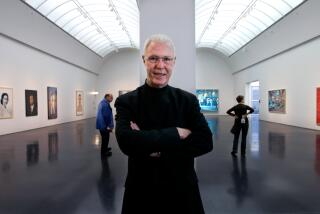BAREFOOT COMPOSER : DRESHER AT FESTIVAL OPENING
At their best, labels are deceptive; at worst, fraudulent. Up to now, several labels have been pinned on the rising reputation of composer Paul Dresher, the 34-year-old âperformance artistâ (whatever that means) who opened the ninth CalArts Contemporary Music Festival in Japan America Theatre on Thursday night.
Dresher has been called a âpost-minimalistâ--to which he has defended himself with the self-description, âpre-maximalistâ--and a âone-man band,â because he plays the guitar and controls his electronics (with bare feet) at the same time.
In fact, and within the self-imposed limits of his eclectic background--as a (former) rock musician and a composer whose influences include older writers as diverse as Robert Erickson, Bernard Rands and Lou Harrison, as well as Eastern musics--Dresher comes to this point in his career with the full aesthetic weight any spectacularly gifted young creator of music ought to carry. Donât be fooled by the electronic paraphernalia and the sleeveless T-shirt: In his own historical context, Dresher is as conservative as Brahms was in his.
He proved it Thursday in a sampling of five works from the past five years, including the world premiere of âWas Are/Will Be.â
As a second-generation minimalist--and one uses that label only to describe the phenomenon of Dresherâs attractive, clever, canny, constantly changing and kaleidoscopic soundscape, not to prejudge it--the lean and personable guitarist deals in the same basic musical materials available to Czerny, Debussy and Philip Glass. One names those three of Dresherâs musical ancestors because one can hear their influence in his works, not as old baggage, but as vital force.
In âCasa Vecchia,â which the Kronos Quartet introduced to Los Angeles in December, 1982, and repeated Thursday, Dresher finds new life in C minor/major, exploring in the process bitonality with fresh ears. In âDark Blue Circumstance,â for solo guitar (the composer) and live tape processing, he plays with consecutive thirds as ingenuously and uncloyingly as if Delibes had never lived.
In âDestinyâ (1983), for guitar, drums (Gene Reffkin) and tape processing, those saccharine thirds have been replaced by aggressive fourths, simple counterpoint with multilevel linear activity. In the earlier âChannels Passing,â an uncomplicated exercise in juxtaposition of textures becomes a triumph of form; the colorful audience in the Japan America Theatre even cheered that triumph.
âWas Are/Will Beâ is a theater-piece, with text by Rinde Eckert, for synthesizer, tenor (Eckert), drums and tape processing. It sits stylistically within the parameters marked off by the other four works on this program, but has the additional and considerable extra resonance of the texts.
In this first performance, which seemed resolutely well prepared, all parts appeared to fit each other. And, as seems to be the case with most of Dresherâs compositions, this one gave no evidence of lasting one moment longer than absolutely necessary.
The performances emerged mixed. Thirteen members of the CalArts Twentieth-Century Players produced what seemed a rough and not-quite-ready reading of âChannels Passing.â The Kronos Quartet, looking tired and sounding sometimes brittle and scratchy, nevertheless brought unbending conviction to the complexities of âCasa Vecchia.â In the first half of the evening, the ensemble of guitarist Dresher, drummer Reffkin, narrator Eckert and sound engineer Jay Cloidt operated smoothly and uneventfully.
More to Read
The biggest entertainment stories
Get our big stories about Hollywood, film, television, music, arts, culture and more right in your inbox as soon as they publish.
You may occasionally receive promotional content from the Los Angeles Times.










